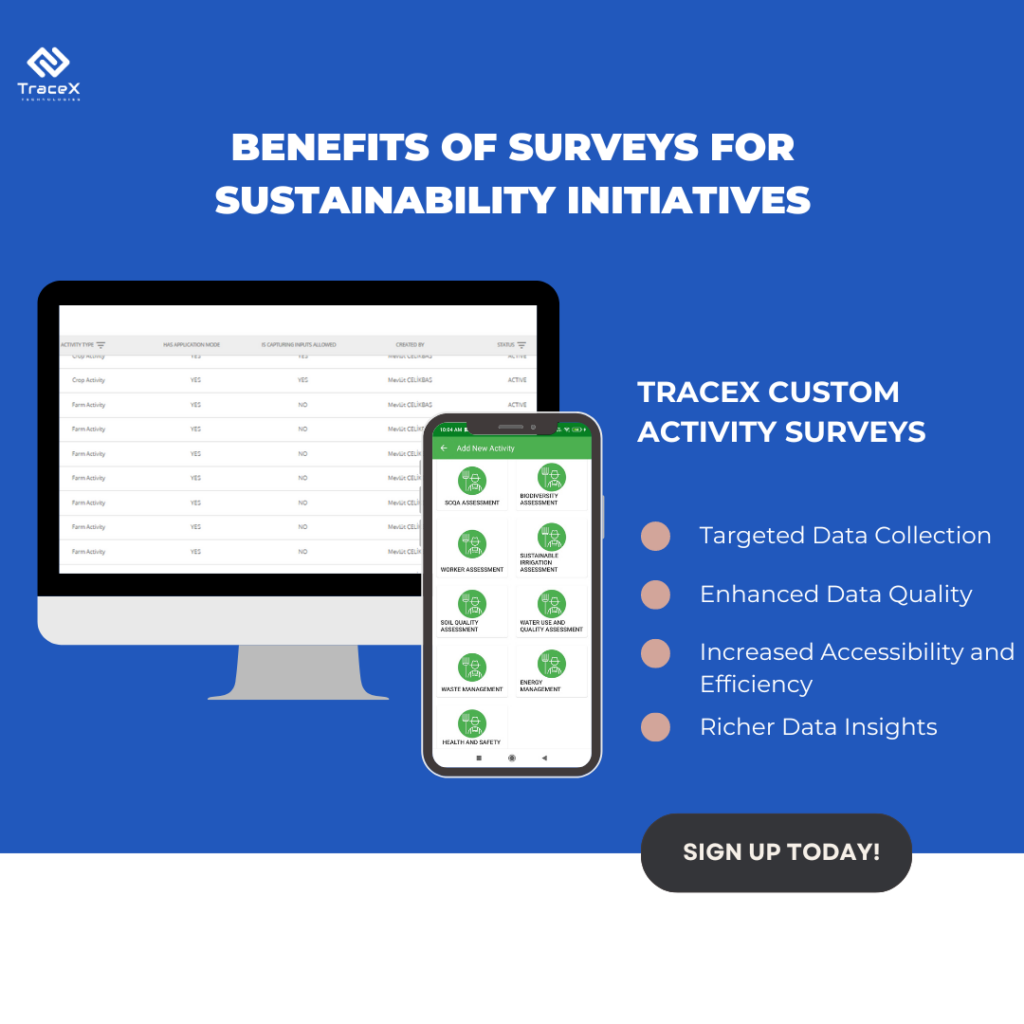Contact: +91 99725 24322 |
Menu
Menu
Quick summary: Want to take your sustainability initiatives to the next level? This blog explores how data aggregation and surveys can be powerful tools to measure progress, empower stakeholders, and achieve real impact. Learn how to harness data for effective decision-making and transparent reporting to build a more sustainable future.

Sustainability is no longer a buzzword; it’s a pressing need. But how do we translate good intentions into tangible results? Data aggregation and surveys can be your secret weapon in the fight for a more sustainable future
Move beyond assumptions and pinpoint specific environmental or social issues demanding your attention. Track the effectiveness of your sustainability efforts and demonstrate real-world results. Use data-driven insights to inform decision-making and garner support from all parties involved.
Let’s unlock the power of information and turn your sustainability goals into a reality!
In the pursuit of a more sustainable future, data is king. But raw data, scattered across various sources, can be overwhelming. This is where data aggregation steps in, acting as a powerful tool to organize and analyze information, providing valuable insights for effective sustainability initiatives.
Data aggregation refers to the process of collecting data from multiple sources and combining it into a centralized, unified format. This can involve data from various departments within an organization, external databases, sensor networks, or even different platforms. The key is to bring together diverse data sets to create a more complete picture of a particular issue or system.
So, why is aggregated data crucial for sustainability analysis?
The data sources for sustainability initiatives can be as diverse as the initiatives themselves.
By leveraging data aggregation from these diverse sources, organizations can gain a holistic understanding of their sustainability performance and make data-driven decisions that contribute to a greener future.
Data aggregation provides a powerful lens on the objective aspects of sustainability. However, understanding people’s attitudes, behaviours, and needs is equally crucial for successful sustainability initiatives. This is where surveys come into play.
A survey is a systematic collection of data from a population or sample group, typically through questionnaires or interviews. Here are some common types of surveys used in sustainability initiatives:
Surveys offer a multitude of benefits for sustainability initiatives:
There are various ways to conduct surveys for sustainability projects. While Paper-Based Surveys are less common in the digital age, paper surveys can still be useful for reaching specific populations with limited internet access. Mobile apps can be used to conduct surveys on smartphones, increasing accessibility and response rates.
By leveraging technology platforms and mobile apps, organizations can overcome the challenges of data aggregation and surveys, leading to more efficient data collection, improved data quality, and ultimately, more effective and data-driven sustainability initiatives.

TraceX offers a Sustainability platform designed to streamline data aggregation and surveys for sustainability projects, particularly those focused on sustainability initiatives. The solution configures custom surveys as activities within its platform and facilitates data entry through mobile apps and file imports:
TraceX allows users to design custom surveys tailored to their specific needs. This could include multiple-choice questions, open-ended questions, image capture options, and location tagging for gathering geospatial data. Surveys can be directly linked to specific project goals and activities within TraceX. This facilitates targeted data collection and analysis aligned with project objectives.
The platform offers a user-friendly mobile app for both Android and iOS devices. This empowers project participants, such as farmers or field staff, to complete surveys directly in the field, even in areas with limited internet connectivity. The mobile app allows users to download surveys and complete them offline. Once back in an area with internet connectivity, the app automatically synchronizes the completed surveys with the TraceX platform. The app can leverage GPS functionality to capture the location data associated with survey responses, providing valuable geospatial insights. Surveys can be designed to include image capture options, allowing participants to document observations, record progress, or showcase specific aspects of their practices.
TraceX allows users to upload pre-existing survey data in various file formats like CSV or Excel. This is useful for incorporating data collected through traditional paper-based surveys or external sources. The platform offers basic data validation and cleaning tools to ensure the accuracy and consistency of imported data before integration with the main platform. File imports allow for bulk data entry, saving time and resources compared to manual data entry within the platform.
A spice processing company has implemented TraceX Solutions to streamline their sustainability assessments and SCQA (Supplier Capability, Quality, and Accountability) evaluations for farmers.
Separate custom activities are created within the platform for both SCQA assessments and Sustainability assessments. This ensures focused data collection for each evaluation type. The solution allows scheduling these activities to occur once per crop season, prompting field technicians for data collection during the appropriate time frame.
The mobile app empowers field technicians to conduct SCQA assessments directly in the field. The app provides access to pre-designed questionnaires and surveys for SCQA evaluation. The spice company can update SCQA surveys within the platform. Field technicians have access to the latest versions, ensuring consistent data collection across all farmer evaluations.
Upon completion of the SCQA survey in the field, the technician submits the data electronically through the mobile app. Supervisors can access the submitted SCQA data reports within the platform. This data informs decisions regarding farmer inclusion or inactivity for the current crop season within the project.
Similar to SCQA, the spice company can design custom surveys within the platform to capture data on various sustainability factors, such as water usage, soil health, biodiversity impact, waste management, and worker well-being. Field technicians can leverage the mobile app to complete these sustainability surveys during their visits, capturing real-time data from the farms.
The platform allows for the integration of data from both SCQA and sustainability assessments. This provides a holistic view of each farmer’s practices. By analyzing combined data, the spice company can identify areas for improvement among farmers, prioritize support initiatives, and track progress towards overall sustainability goals. It also facilitates the generation of reports summarizing SCQA and sustainability assessment findings. This allows for transparency with stakeholders and demonstrates the company’s commitment to responsible sourcing.
Conclusion
In conclusion, data aggregation and surveys are not just tools for gathering information; they are powerful catalysts for positive change. By harnessing their potential, you can move beyond good intentions and achieve measurable progress on your sustainability journey. Embrace data-driven decision making, empower stakeholders through surveys, and unlock the power of transparency through comprehensive reporting. Remember, a sustainable future starts with a clear understanding of the present – and data aggregation and surveys are the keys to unlocking that understanding. Let these tools empower you to build a more sustainable future, one informed decision at a time.
